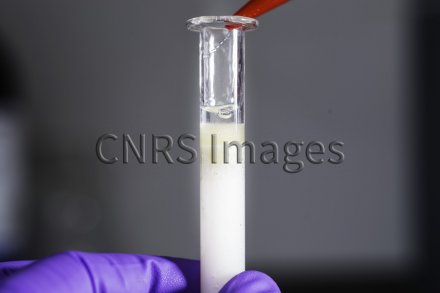Production year
2016

© Cyril FRESILLON/ISTO/CNRS Images
20160080_0084
Separation of the different chemical fractions of core sample sediment extracts taken from a sand filter in preparation for the chromatographic analysis of their composition in terms of molecular biomarkers and organic pollutants. The sand filter is a water purification device located under the Quai de la Madeleine in Orléans. The device filters some 7 million cubic metres of wastewater and rainwater from the north of the city each year. The water is then channelled to treatment plants downstream. The conical basin is 17 m deep and is entirely buried underground. The sediment accumulated since the construction of the basin in 1942 will help researchers reconstitute more than 70 years of local history. The renovation of the sand filter was the perfect opportunity to take core samples of the sediment and examine its content. The diversity and the changes in the markers observed over time open up new perspectives on the chronology of events across the catchment area, with the focus on issues of major concern such as public health, pollution, biodiversity, transportation and the power supply.
The use of media visible on the CNRS Images Platform can be granted on request. Any reproduction or representation is forbidden without prior authorization from CNRS Images (except for resources under Creative Commons license).
No modification of an image may be made without the prior consent of CNRS Images.
No use of an image for advertising purposes or distribution to a third party may be made without the prior agreement of CNRS Images.
For more information, please consult our general conditions
2016
Our work is guided by the way scientists question the world around them and we translate their research into images to help people to understand the world better and to awaken their curiosity and wonderment.